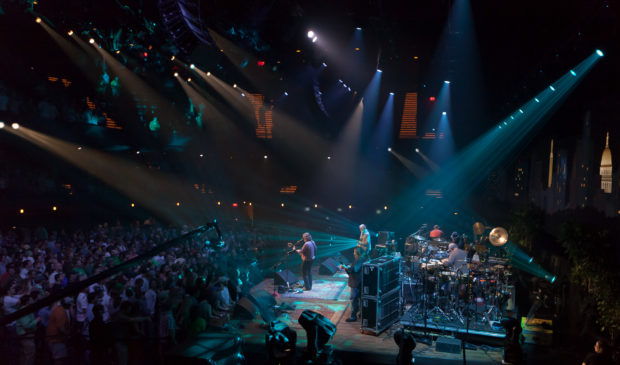Music venue owners see holes in ‘imperfect’ proposals to protect them
Wednesday, May 10, 2017 by
Chad Swiatecki Music venue operators from many parts of Austin have reservations about a pair of proposals created to address friction between increasing residential development and entertainment-oriented businesses.
At a summit for local music venues on Monday, operators from venues in East Austin, the Rainey Street District and the Red River Cultural District expressed their concerns over the power that residents’ complaints and feedback could have in limiting their ability to do business in the coming years.
The summit was one of a series of community forums held by the city’s Economic Development Department to discuss the so-called “agent of change” principle and a move to require entertainment licenses for outdoor music venues, with an eventual expansion of the license to all live music businesses. The proposals, which could still undergo some alterations, are currently being drafted into ordinance language and are expected to be voted on by City Council early next month.
Concerns expressed Monday include confusion by the Austin Police Department over what qualifies as a music venue, the potential for guests in newly constructed hotels to lodge complaints against long-standing music venues, and the city’s reluctance to require minimum building and soundproofing standards for hotels and residential buildings constructed close to entertainment districts.
“These are things where the devil is in the details, and we know where it is that the friction traditionally comes from,” said Cody Cowan, general manager of the Mohawk nightclub. “Some of this still creates an undue burden to have to carry out. We know for a fact that the landscape is going to change, and (Austin Neighborhoods Council) will still be vocal in front of Council no matter what we try to do to deter them.”
The agent of change and license requirements are intended to create clearer expectations for venues and new development, with an emphasis on documented awareness of the presence of potentially noisy clubs nearby. While the proposals wouldn’t prevent a property owner from being able to sue a club over a sound issue, they would keep city regulations from coming into play in deciding fault.
Included in the city’s presentation to the operators were details on gathering data on ambient sound levels throughout the city, to better gauge the volume distinctly created by live music at venues’ property lines.
Some club owners felt the agent of change measure doesn’t head off enough potential conflict, because it is aimed at residential developments and not hotels. Specifically, hotels would not be required to inform and prevent guests from filing complaints about loud noise.
“It comes down to venues needing to take on the burden of designing their acoustics to not be a problem,” said Will Bridges, co-owner of the Antone’s and Lamberts live music venues. “Builders won’t spend the extra money (on soundproofing) to be nice, but maybe if they’re going into a situation where that responsibility is on them, then they can have a way of getting it worked out in advance.”
Council’s likely approval of the proposals comes as the city is also advancing in the process of revising the CodeNEXT building code document that will guide growth and development in Austin for the next few decades. Alex Lopez, deputy director of the Economic Development Department, said CodeNEXT will almost certainly impact how music venues will interact with the city’s growing population, with a revision to the proposals almost certain in two years.
Nathan Hill, co-owner of the White Horse and Stay Gold nightclubs in East Austin said two years of imperfect protection from potential noise complaints will almost certainly impact clubs in Austin, which are increasingly under threat from rising rents and development pressure.
“Two years is sort of an undue burden, and to not have hotels included in agent of change makes it more of a stick than a carrot for venues when putting in considerations for hotels shouldn’t be hard to carve out,” he said. “Residents already have a more solidified voice but hotels will come after us if they find a weak point, and what they’ve done is leave us wide open.”
Photo by Earl McGehee made available through a Creative Commons license.
The Austin Monitor’s work is made possible by donations from the community. Though our reporting covers donors from time to time, we are careful to keep business and editorial efforts separate while maintaining transparency. A complete list of donors is available here, and our code of ethics is explained here.
You're a community leader
And we’re honored you look to us for serious, in-depth news. You know a strong community needs local and dedicated watchdog reporting. We’re here for you and that won’t change. Now will you take the powerful next step and support our nonprofit news organization?









